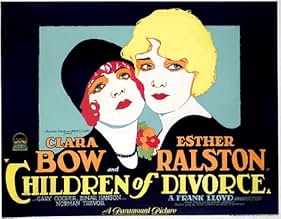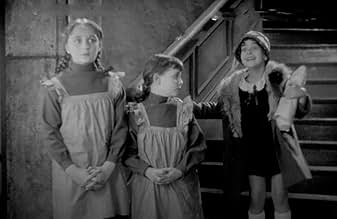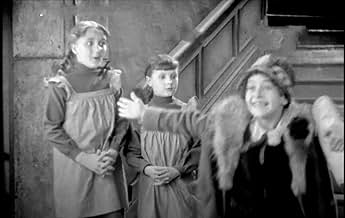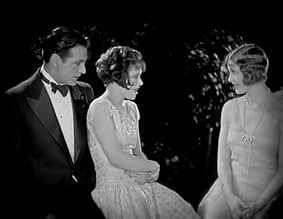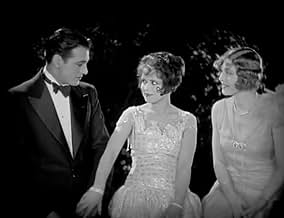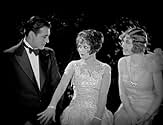Aggiungi una trama nella tua linguaA young flapper tricks her childhood sweetheart into marrying her. He really loves another woman, but didn't marry her for fear the marriage would end in divorce, like his parents'. Complica... Leggi tuttoA young flapper tricks her childhood sweetheart into marrying her. He really loves another woman, but didn't marry her for fear the marriage would end in divorce, like his parents'. Complications ensue.A young flapper tricks her childhood sweetheart into marrying her. He really loves another woman, but didn't marry her for fear the marriage would end in divorce, like his parents'. Complications ensue.
- Regia
- Sceneggiatura
- Star
- Boarding School Student
- (non citato nei titoli originali)
- Party Guest
- (non citato nei titoli originali)
Recensioni in evidenza
Ralston claims being on the set with the 22-year-old Clara was both enjoyable and scandalous. She recalls Bow describing in detail where and how she and her actor boyfriend Cooper made love, causing cast members to experience a red glow on their faces listening to such escapades. Bow also saved Cooper's budding career by intervening on his behalf when Lloyd threatened to release the young actor for constantly not remembering his movements in a early scene. Cooper's visibility in "Children of Divorce" catapulted his screen presence, launching him towards Hollywood stardom.
As for Clara, "Children of Divorce" provided her with one of the most dramatic scenes in her growing portfolio. Near the film's ending, Bow's character swallows poison because she realizes she can't marry a prince. She lays in bed comforted by her childhood friend Jean, who forgives her for her past indiscretions. The dramatic sequence's atmosphere required more than director Lloyd provided. So Paramount brought in young director, Josef von Sternberg, who was gaining a reputation for his expert lighting, to reshoot Kitty's final moments. His genius was to provide the shadow of a curtain sweeping over her as the nun lowers the wondow drape, emphasizing the end of Kitty's tempestuous life.
The film is what amounts to a polemic on the hazards of divorce but is not without merit. There are several poignant, sentimental moments which hold up due to some very competent performances, even by Cooper himself in his first big part. The year is 1927 and the film holds some very outdated views of marriage and divorce but, as often with silents, they must be viewed with a sense of atavism, as when one goes to a museum - or, in this case, a film festival. (Capitolfest, Rome, N.Y., 8/12/16.
** 1/2 (out of 4)
As the film starts off we're told about special homes where children of divorced parents can go and stay. We then meet Kitty who is dropped off by her mother and can't make friends but soon Jean becomes an older sister to her. Jean meets Edward and the two make a childish joke that one day they will marry. Flash-forward and Kitty (Clara Bow) is a flapper and soon a drunken night leads to her marrying Edward (Gary Cooper), which of course breaks the heart of Jean (Esther Ralston).
CHILDREN OF DIVORCE is the greatest movie that its stars ever made. In fact, I honestly thought there were quite a few problems throughout the picture and it wasn't nearly as good as I was hoping for when I went into it. With that said, both Bow and Cooper are legends of the screen and them alone makes this worth sitting through.
The story itself is pretty melo-dramatic and downright predictable at times. For starters, the story never really makes any sense because as children the Bow character is pretty much a shy and timid girl. Then, when we see the adult version, there she is as this loud, over-the- top party girl. There's just nothing here that's very believable as the first portion just seems over-dramatic and the second portion is just your typical Bow character from this period.
I'm certainly not going to ruin what happens as the movie goes along but there's no question that it's rather unbelievable and I'd argue that the ending is laughably bad and predictable. It's certainly a morality tale but to me it was just a bit overdone for its own good. Director Frank Lloyd (with apparent re-shoots by Josef von Sternberg) does a decent job at keeping the film moving but visually there's not too much here.
I thought Bow was good in the film, delivering the type of performance that you'd expect from her. This certainly wasn't her best role but there's no question that it's hard to take your eyes off of her. Cooper was also good in the part, although it's clear he was still learning his way on the screen. I didn't care too much for Ralston's performance as she was certainly the weak link.
It seems I'm really coming down hard on CHILDREN OF DIVORCE but perhaps it's mainly due to how disappointed I was in it. It's a decent movie and certainly worth watching if you're a fan of the stars but there's no question that they did much better work.
The "It" girl herself plays the adult Kitty; vivacious Clara Bow is wonderful as the sexually aggressive woman, who needs to marry well. Jean, Kitty's protector as a child and now described as the richest woman in America, has grown into lovely Esther Ralston. Ralston, who seems to have been largely forgotten, gives a naturalistic performance as a caring understanding woman, who is capable of self sacrifice. However, Jean's money is like catnip to the impoverished Prince Ludovico, played by Einar Hanson, and his uncle, Duke Henri, played by Norman Trevor. But the Prince and his uncle have to compete with tall lanky Gary Cooper of the piercing blue eyes, who captivates both Jean and Kitty. As the adult Edward, Cooper has it all: startling good looks, wealth, education, and lack of ambition. Besides the three stars, Hedda Hopper as Kitty's self-absorbed mother also makes an impression, although the rest of the cast has unfortunately fallen into obscurity.
Besides the melodramatic plot, a few aspects of this silent film may be off putting to general audiences. While the sets are convincing, they are so tall they disappear into the clouds, and the gargantuan doors dwarf the performers. Although a few flourishes of the grand style intrude, the acting is generally natural and underplayed. The film is short, even shorter if the inter-titles are taken into account, and director Frank Lloyd maintains a good pace. However, "Children of Divorce" will likely appeal primarily to silent-film buffs. Already attuned to both the limitations and the pleasures of pre-sound movies, aficionados of silent cinema can overlook the unconvincing drama and relish the luminous stars. Indeed, they had faces then, and Clara Bow, Gary Cooper, and Esther Ralston provide ample evidence herein.
By their next onscreen encounter, Cooper was elevated to be the male lead, albeit in a very female centric melodrama. "Children of Divorce" is a morality tale that asks, whether children of divorced couples are more likely to become divorcees themselves. Thus, its attempt is to glorify the sacred nature of marriage by casting shame on divorced couples. It's not a subtle film. Like many a silent film, it begins with the characters as children. All three, Jean (Ralston), Kitty (Bow) and Ted (Cooper) were raised in a children's home run by nuns, because their rich, divorced parents couldn't bother to take care of the kids themselves. As they grow up, Jean and Ted are in love and want to marry, but Kitty also has an eye for Ted.
The contrast between Jean and Kitty is shown to be night and day. Jean is respectful, "wife material" so to say, while Kitty is a carefree flapper who likes to have fun. During a night when he gets drunk, Kitty tricks Ted into marrying him, and when it's announced that they are going to have a child, Jean won't allow Ted to divorce Kitty, because then world would have one more child of divorce. If you can't guess the outcome, you probably haven't watched too many silent melodramas.
I have mixed feelings about this film. The core merit it has going on, is the presence of Bow and Cooper, who are both very charismatic. The film is worth watching solely because of them. I dislike films that give such a black and white separation of good girls and bad girls. From my perspective, probably from today's perspective, Ralston appears boring and lifeless, while Clara Bow's charm has not been damaged by the years. I for one would love to wake up and discover myself married to a girl like Kitty. The film is heavy-handed with its marital themes, and it feels like it tries to brainwash the female audience into obedient housewives and dutiful mothers. Clara Bow is another alternative for a female role model, and therefore must be destroyed. "It" presented Bow's sex appeal in a lively way, and allowed it to exist. This film looks down on her, even if she is the star.
I also have never liked the American notion of "childhood sweethearts must marry as adults" in films. This is nonsense. It is very unlikely, that the first person of the opposite sex that you meet, is going to be the most suitable marital candidate you will ever meet. Therefore films like this, that tell the audience how Ted and Jean must be re-united, because they loved each other a long time ago, don't really hit home for me. There is even a creepy scene, where Ted stares at Jean, who is comforting his child, and imagines Jean as a little girl. It played the wrong way in this context, sorry.
So all in all, as a narrative, this doesn't hold up even a bit. But it does show how Cooper can act and led to better parts for him. Clara Bow may be the bad woman here, but she is easily the most memorable thing in the film.
Lo sapevi?
- QuizJosef von Sternberg was called in by Paramount to reshoot some scenes, shoot new scenes and recut the existing footage after executives made the determination that the film was not releasable.
- Citazioni
Kitty Flanders: You'd make a marvelous second husband but you are too much of a luxury for a poor girl's first husband.
- ConnessioniFeatured in Hollywood (1980)
I più visti
- How long is Children of Divorce?Powered by Alexa
Dettagli
- Data di uscita
- Paese di origine
- Sito ufficiale
- Lingua
- Celebre anche come
- Children of Divorce
- Luoghi delle riprese
- Azienda produttrice
- Vedi altri crediti dell’azienda su IMDbPro
- Tempo di esecuzione
- 1h 10min(70 min)
- Mix di suoni
- Proporzioni
- 1.33 : 1


